
1991 Part Three
| Part One | Part Two | Part Four | Part Five |
Interview - Select magazine - circa March 1991
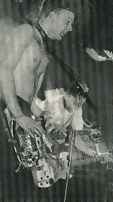
You've probably noticed already, but Jesus Jones are a very, very modern pop
group. They smell new, as if someone's just split open the cellophane. In years
to come someone will hear 'International Bright Young Thing' and think the Gulf
War, or Lithuania, or the episode of Twin Peaks where Officer Andy whacks
himself in the face with a loose board and goes to Disneyland for a couple of
minutes.
But there are dangers here. Age of Chance (remember them?...exactly!) were also
a very, very modern pop group. They wore cycling shorts and did a version of
Prince's 'Kiss' that everyone liked for about 40 seconds. There is a danger
of being handcuffed to a particular time because of you appropriateness for
it.
Jesus Jones seem to have sidestepped this problem quite neatly, somehow. They're
a very, very modern pop group, yeah, yeah, but they were a very, very modern
pop group two years ago as well, when their seminal, crazily exciting debut
single 'Info Freako' slipped its leash and harassed enough people to give them
a generous groundswell of hardcore fans.
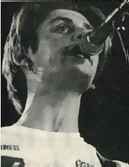
Now we have the 'Doubt' LP (Select's Album Of The Month, last month)
which is state-of-the-art, fast, nasty and more in-your-face than a mask.
Somehow, you have the feeling that you'll be listening to it for a while.
"As long as you make records that are state-of-the-art all the time,"
says frontman Mike Edwards over his coffee, "then you're OK. It's essential
that pop music and rock music is very clear about the time in which it was made.
Like Art Of Noise - their records sound very early '80s now and they're all
the better for it."
"We all use technology. We're not led around by the nose by it. You become
the worst kind of muso when that happens. This wonderful machine! It does this
and this and this! And it sounds like shit. We use technology, bend it, move
it, do anything we can with it to make it work for us."
In their press photographs, Jesus Jones scowl a lot. They don't quite fume,
but they seem to be thinking about it. Hard-asses, you think. Big nasty pop
star brutes who piss in the sink. Predictably enough you couldn't be more wrong.
Mike Edwards is a teddy bear. Articulate, friendly, inoffensively dressed in
black polo-neck and jeans, you could break one of his records in front of him
and he'd say, "I see what you're getting at, yes....". Great guy.
"Calling the album 'Doubt'," he begins, staring into the middle-distance
of Canalot Studios' brasserie. "I did it for a number of reasons, and one
of them was a reaction against the times. I felt there were a lot arrogant bands
about - who were taking that arrogance on as a pretence."
"One big band comes along and they're real surly, people start making the
same sort of statements, and you know it's a pretence because it's been done
already and it was successful. Being opinionated and objectionable is fine if
that's really how you are, but doing it because it's already been done is repulsive."
Jesus Jones simply make the mistake of being confident. 'Info Freako' was a
supremely self-assured record. They knew they had something going and they weren't
afraid of it. Sadly, the high expectations that came from the single were dashed
on the unforgiving angles of their first album, 'Liquidizer'. 'Info Freako'
became the yardstick against which much of what followed was unfavourably compared.
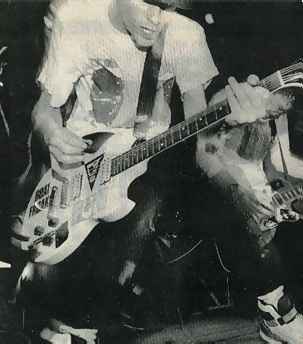 "I'm
not sorry we released 'Info Freako' when we did, no" says Mike. "It
was such an enormously important record for us. None of what we have now
we'd have without 'Info Freako'. Besides, people have stopped saying that
during the last six months. But we're grateful to that song, and we'll
always repay it by playing it live."
"I'm
not sorry we released 'Info Freako' when we did, no" says Mike. "It
was such an enormously important record for us. None of what we have now
we'd have without 'Info Freako'. Besides, people have stopped saying that
during the last six months. But we're grateful to that song, and we'll
always repay it by playing it live."
'Liquidizer' begged the question of how far it was possible to take the idea
of Jesus Jones. They seemed limited to one fixed point in time, one (admittedly
great) song. 'Doubt' changes all that. It has a wider focus and a great number
of admittedly great sings. But the question remains, how far can they go?
"Ultimately, we can take Jesus Jones as far as music goes. That's my naive
response. As long as I'm interested in music - hopefully modern music - then
Jesus Jones will continue to make proactive and interesting records."
The inner sleeve of 'Liquidizer' listed the band's influences (numbering 38
in all, including Big Black, The Byrds, The Shamen, Mel & Kim, Head Of David,
Apocalypse Now, Hendrix, Faith No More, Eric B & Rakim, and so on
and so forth). It was less a list than a menu of what was in store. These people
had more than simply influenced Jesus Jones; they had been assimilated
by them. Jesus Jones sounded like everybody, simultaneously.
"It's the music outside of Jesus Jones that makes Jesus Jones what they
are," explains Mike. "We formed almost totally because of the sudden
spark that happened when rock music and rap music and dance music all met. It
was the impetus from outside forces that really got us going. On the first album
there was that list of people. This time it's all about pirate radio stations,
it's been that that's influenced us more than anything since 'Liquidizer'."
"To some extent it's rather like what was said of David Bowie - that he
is good when music in general is good. I see us as being the same way."
Right. So, Jesus Jones are post-modernists....
"We're not a post-modern band because I don't think there was ever a modernism
in music," he says, recoiling from the idea. "Certainly, all we do
is combine and make something new of other people's ideas, existing ideas,
but it all depends on how diverse and extreme the elements are, how unusual
they are."
"In 1988 it was unheard of to mix rock and dance music, at least not in
a way that wasn't gimmicky, or in a way that really worked the same way a great
rock band works. I see us as being in a long line of classic bands...Beatles,
Stones - bands who brought all sorts of eclectic influences together and made
great music."
Visually, attitude-wise (give music a breather for a second) Jesus Jones are
a perfect rock band. But to be a perfect rock band in the '90s means, to some
extent, being a cartoon, This is not an insult,. There's far too many strenuously
'real' people making music. We certainly don't need another Del Amitri, another
Beautiful South. We need another Banana Bunch!
Jesus Jones aren't the Banana Bunch, but there's still time. The old press-biog
hints at Saturday morning BBC1 yearnings, with assorted nonsense about skateboards
and such. We even have the band members' nicknames for easy reference: Gen (drums)
is The Human Pellet; Al Jaworski (bass) is Tagnut The Bold; Jerry De Borg (guitar)
is Mister English; Barry D (keyboards, since replaced by Ian Baker) was Eggy
McChet; and Mike is Foghorn Leghorn. Those guys!
Foghorn and the lads formed JJ in October 1988, signed to Food records
within two months and released 'Info Freako' about two minutes later (the
single was recorded for £125 - not a lot of money, even in those
days). Then, 'Liquidizer', some revelational gigs, more singles (giving
the charts a mauling this time), and now 'Doubt'. It's safe to say that
with this album, Jesus Jones have arrived. Finally.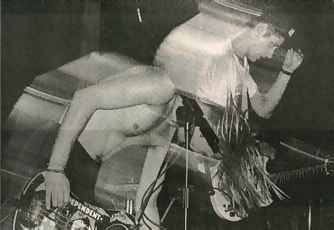
"I love everything about being in a band," says Mike, taking the opportunity
to stretch contentedly. "Every aspect of it. And there are times, onstage,
when you just get transported. You stop thinking about pain...I mean, when pain
doesn't exist...You can be playing a gig and you'll think, God, I've been sweating
so much it's all over the guitar. It's only afterwards you look down and it's
covered in blood. You've been slicing your fingers away, oblivious."
One thing Jesus Jones haven't been able to do so far is translate that kind
of abandon to vinyl. Jesus Jones gigs are legendary; the records (good as 'Doubt'
is) are not.
"We haven't captured what we do live, no," says Mike. "But to
some extent that's deliberate. I'm a very firm believer that everything we do,
every medium we're involved with - playing live, releasing records, doing videos
- should be kept distinct from one another. We do different versions with songs
when we're doing them live, and there is that fact that it is live, that
you're there doing the songs."
People do go on about it, though.
"Well, people have said, y'know, this song is so great you should get it
like that on record. But when you do it somewhere, it doesn't sound all that
hot. As well as that, we are pretty visual, it's so immediate when you see us
live - I do think it tends to knock people's critical faculties a little bit."
But if everything is kept distinct from everything else, do you not run the
risk of coming across half-assed in your overall approach?
"Nah, rock music is most importantly about attitude and you approach everything
with the same attitude. It affects how you ride your bike down the road, whether
you use the killer instinct or the meek-shall-inherit-the earth instinct."
Or the Jesus Jones instinct: pedal fast into the path of an oncoming truck called
the '90s, reduce truck to heap of smoking metal, keep going...

Letters Page - Smash Hits - Circa March 1991

Dear
Gordon!,
In the video for "Who? Where? Why?", and also at one
of his recent gigs, Mike Edwards from Jesus Jones wore a long-sleeved
T-Shirt with the words "Air Jesus" written on it.
Could you tell me if ordinary mortals can get their hands on
them or if it was just specially designed for him as I want
one now!
Julie Gallagher, Tottenham, London.
Gordon! replies: Mike apparently bought the T-shirt from a shop in Camden, North London, but Gordon!'s further investigations were rather hampered by the fact that the shop has now closed. Oh well. It might not be easy to buy them anyway as the T-shirts are basically bootleg versions of the Air Jordan footwear (i.e. the Nike trainers) symbol and are highly unlawful anyway. Jesus Jones are currently in France on the second leg of their European tour and will have another single from their "Doubt" LP out in the next couple of months.
Note: A recent email (2011) from Martin Gates provides a better answer than Smash Hits. Martin got his in 1991 from a shop in Sheffield called The Vee. There were two types, the one he has which is the same as Mike's and a black one which has the Jordan sign down each arm, the cost was £22! Pictures of the front and back are below, thanks for the info Martin:

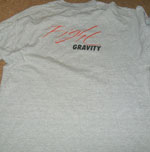
Interview - New Musical Express NME - 30th March 1991
After our UK tour, we have all had just enough time to check our homes have not been burgled, burnt, re-possessed or cut off, and that we still have living relatives. The comparatively easy part of the world tour over, the hardest part for us is now, when Jesus Jones voyage into the Dead Zone, Europe.
It's not much of a surprise that the mainland hasn't paid much attention to us in two years, as we haven't paid attention to it. The total sum of our European touring to date comprises of four one-off dates and a support slot to The Cramps last year when the audience spent most of our set shouting "Go boil yer head" in five different languages. We get more recognition crossing the Atlantic or the Pacific than we do crossing the Baltic or the English Channel. Time for things to change.
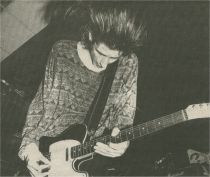 SATURDAY
SATURDAY
By midday the five band members and UK crew are leaving London in our small penis, immense tour bus (the bigger the transport, the smaller the genitals, old rock 'n' roll folklore). The monster is our transport and hotel, and frankly the room service is crap.
There are two lounges, the top one where you can be poison-gassed by smokers, the bottom one where, because the driver has not replaced the cap correctly, you can turn blue from diesel fumes. The beds offer a parody of sleep; you lie down and close your eyes for eight hours and wait for sleep to mug you, but in vain.
The on-board toilet has a notice on the door saying "Loggen Verboten". It has another notice saying "Jesus Jones Dressing Room". Ho ho, crew humour. To get into the toilet you have to be a midget contortionist.
We reach Dover, where I am feeling strange. I attribute it (wrongly, it transpires) to diesel and only having eight hours sleep in the previous two nights.
Dover. As we wait to board the ferry, DJ Steamin' Norman Hines, our support for this tour, challenges me to a game of video football and while in the process of thrashing him, a gaggle of school kids ask to take my photo. As I'm winning and thus looking haughty and full of bravado, I agree. I also agree because two miles south-east, no one has a bloody clue who I am.
On the ferry, Iain Baker the keyboard breaker buys anything reduced in price, Gen and I get lashed by salt water, Al and Jerry head straight for the bar and David, our Australian sound man, gets into conversation with some schoolgirls. Pretending to be a member of AC/DC's crew, he asks them what English bands are happening at the moment. 808 State do well.
"What about the Jesus bunch then?"
"Oh, Jesus Jones, yeah, well they're pretty successful but it's all long hair, we-love-ourselves sort of stuff." Things are looking brighter!
SUNDAY/GERMANY
The inhabitants of Bremen are shocked to see 11 aliens exiting a large yellow vehicle. They must be aliens as none of them have proper eyes, just huge swollen eyelids contained in deep, dark recesses either side of their noses. We aliens are here en route to Norway, and it works out cheaper for us to drive through France, Belgium, Germany, Denmark and Sweden that to ferry direct to Oslo.
During the night we crossed two borders. Customs officials are duty bound to remove everything from the coach to check that our proffered gear list is accurate. This is where the bribery comes in. Usually a couple of T-shirts will do, but the French are very straightforward about it. "Have you got something for us to drink?"
Our tour manager Gimpo (immortalised by Ted and Eddy Kennedy on Going Live as "that Gimpy from Jesus Jones") makes up a special cocktail of his own.
Foot down driver!
Back in Bremen the aliens are hungry, so we use the golden rule of communication abroad: speak just one or two phrases of the native language badly and it becomes obvious that you are the British abroad, a cue to be pitied and plied with help and sympathy.
Driving to Denmark, it's leisure time on the coach. The Naked Gun on video, Jerry sleeping, Iain saving the world with his Gameboy, while I review some singles for a Japanese magazine. There are offerings from the Dream Warriors, Deep Purple, Morrissey, Living Colour, 808 State, Jesus Loves You, Throwing Muses and Ned's Atomic Dustbin amongst others.
They range from total crap to very good, although none of them will change my world. I learn some Swedish and play computer chess, a fiendish device bought two days earlier that beats me continually. I don't let it bother me - after all, who buys the batteries pal?
On Scandinavian ferries we witness the traditional alcoholic migration: with the price of drink prohibitive in Norway and Sweden, each weekend sees a flood of drinkers from expensive countries to the cheaper ones. Late on Sunday night the return in full swing. Whatever your language, it's imperative to shout at full volume while stuffing your face with Frankfurters and holding on to your crate of Elephant Beer.
MANDAG (MONDAY)/GOTEBERG
The aliens are back! The spaceship drives out of town and stops for breakfast at the first truck stop. The crew collapse with lust at the sight of our waitress, a Scandinavian beauty with cheekbones as long as the Swedish border; the sight of the female customs officer prompted the crew to volunteer for strip-searching.
Lust is ever present. Gaynor, our T-shirt girl, relates with horror how she woke in the small hours to the unmistakable sound of someone (as she enthusiastically puts it) 'tugging'. Strangely, ten of us suspect the same person. Life is grim and tough on the road kids!
We drive through Norway. I listen to Curve, Massive, Napalm Death, Lush, Fluke and some Bulgarian voices. I think about the Vikings who originated from here. "Beserk" is a viking word that means blood lust, but then if you'd ferried across the Baltic out of your head on hallucinogenics, mead and the chief's urine you'd probably want to stretch your legs a bit too.
No one we meet in Oslo seems concerned about us being British lager louts. At six I walk around the city centre attempting to get any meal for under £10. Prices in Norway really define the word 'expensive'. Of course, there's always McDonalds, the modern empire on which the sun never sets.
I've been feeling terrible for two days now. Splitting headaches, agonising throat and cold symptoms, so I'm not feeling excited about doing interviews tonight. One interviewer asks if EMF are only supporting us for the British Tour(?). At ten, feeling like death, I crawl into bed. Four hours later I am still staring at the ceiling sucking throat pastilles.
TISDAG (TUESDAY)/OSLO
I have tonsillitis.
Back at the hotel, there is a press conference for us. The Norwegians are indeed shy, no one says a word. "Well then," I say, "who wants to know about the name?"
I'm interviewed by an entrant for the Most Typical Scandinavian Woman competition. She shows me the King's palace. It has no perimeter fence and just two guards. Presumably there is no word for "terrorism" here. MTV interview me. I try to seem human despite feeling and looking awful. I think about cancelling the gig and fall asleep for an hour before waking up covered in sweat and on soaking sheets.
In the dressing room I try every voice preserving trick in the book (the promoter is alarmed to see me hanging from the ceiling drinking sloth urine from a hollowed out yam) while Jerry argues with Gimpo that we must cancel the gig. Gimpo, aware of the sizeable crowd that have already showed up and the MTV film crew, tries every dirty tactic in the book (the promoter is alarmed to see me shoving dirty socks down Jerry's throat).
The atmosphere changes when a Viking woman of my own (ie the missus) arrives fresh from Madrid. Although I'm probably just an excuse for her to see her friends at home again, it makes me feel a little better.
When we finally get on stage I feel like enjoying myself. I turn my guitar up and it cuts like a huge shot of adrenalin. I forget the headache, the fever, I forget about MTV. I don't feel the pain of Alan smacking me with his guitar. I can hardly get a note out of my larynx but I feel better than a tonsilitic James Brown. The Norwegians get the idea and do some serious leaping around of their own.
After the gig I can hardly speak but I feel fine. I even manage to fall asleep on the coach.
ODIN'S DAY/GOTEBORG IGEN
The pattern of the tour is now established: Travel overnight, up for lunch, interviews until soundcheck, eat, then play. We've had half a ton of good news - tonight's gig has sold out and back at home the album is going back up the charts and has sold 140,000 copies. In America it remains at Number One on all the alternative rock charts.
At the gig Stormin' Norman is treating the audience to an English taste in Home Music. The club we are playing tonight is reminiscent of the Borderline in London and is well known for playing House and hip-hop. Norm gets lots of questions about which records he's playing but all his answers mystify the Swedish ravers.
The dressing room graffiti shows that bands come from all over the world to Goteborg. Bands like the Sabri Brothers from Pakistan who, with three separate bits of graffiti, have mispelt 'Sabri', Brothers' and 'Pakistan'. Hope their set was good.
When we get on stage, the audience is crammed up against the monitors and screaming loud Swedish things (possibly "Get me off these monitors"). Midway through the first song, 'Never Enough', we know tonight is going to be good. Again, it takes maximum effort to sing the easiest stuff, but this is what I've been waiting all day for. The stage is tiny and any movement results in another band member being smacked with limb, guitar or keyboard, but in the heat of the moment you don't feel the pain, you just want to keep the feeling going!
There is no chance of us not doing an encore, despite the fact that my voice is so shagged I can only manage an off-key Minnie Mouse impersonation. Someone at the front is yelling for something called 'Info Freako'. "You sing it, I'll play it," I say, both parties comply.
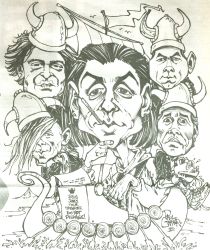 THOR'S DAY/STOCKHOLM
THOR'S DAY/STOCKHOLM
We wake up in Stockholm.
There is a strong body of opinion, mine included, that Stockholm is the most beautiful city in Europe. The old part of the city is particularly inspiring.
A friend of my wife takes Gen sightseeing later and, as well as showing him the sights, tells him what it's like to be conscripted (National Service is mandatory here). Guarding the King's palace in sub-zero temperatures is not for Gen, though.
The afternoon interviews are enlivened by a hotel waiter from Fawlty Towers. Just as I'm getting deep and meaningful for a couple of journalists and photographers, a crazed idiot bursts into the room saying "Why didn't you want Room 620? I made it up specially for you. This room is too small, look at you all. Here is your coffee but you should have it in 620, I told them, but they said no. Why did they say no?"
Each time I try to restart the interview, Manual pipes up again until eventually I ask him if he would like to do the interview. he leaves me with the open-mouthed journalists, tape recorders still running. Ten minutes later he does exactly the same thing.
The venue is a little like a brighter, cleaner Marquee, but heavy metal bands might have difficulty putting their feet on the monitors as the monitors are on the ceiling. Jokingly, Dodge, our guitar roadie, puts the set list on the monitors. Jokingly, we fire him.
Happy Mondays are touring many of the same venues as us, and there's a message from them for The Shamen on the dressing room wall (we kept in contact with The Wonder Stuff in America last year by similar means until eventually meeting up in New York.)
On stage, the set changes for the third time on this tour, partly because we are finding out which songs people know and partly because my voice is in such bad shape that we have to play a truncated set. The presence of fans, friends, media and record company means that we are going to make sure people remember tonight.
I speak Swedish to either appreciation at the effort or laughter at the results, but the gig is one of those where everything goes our way. I even try to put my foot on the monitor.
According to Hotti, our record company man, one of the high spots for the media was when, to demonstrate the falsity of one of their colleagues's live reviews which accused us of using tapes, I walked around the stage demonstrating that there are no tapes when we play live. "Jesus Jones, one nil" was the comment. Even at home people still don't understand this simple low technology.
I am asleep on the coach as Stormin' Norman finishes his second set. Gimpo grabs the coach microphone and yells to everyone that a McDonalds is coming up on the left and it's open!! It is 4am.
FRIDAG/KOBNHAVN
Midday: "Gimpo! Wake up, we're in Copenhagen and a McDonalds might be open. Wake up Gimpo NOW!" Revenge is sweet.
One of the afternoon interviewers actually asks me twice how we go the name. Had I been more awake I would have given him two conflicting answers.
Today is a day off, which means LAUNDERETTE. The search for a launderette allows Gen and I to get our first impressions on Copehagen. There are a lot of bronze stautes everywhere, most of them seem to involve war or men or animals fighting. The trams, another typically European thing, add an extra spice of danger to crossing the road.
One of the benefits of travelling from one country to another is that you can almost survive on record company dinners - another country, another meal ticket! Having eaten myself stupid I feel exhausted, return to the hotel, disconnect the phone, hang up the Do Not Disturb sign and fall asleep for 14 hours straight.
LORDAG/STILL KOBNHAVN
Nothing to do until soundhceck so I get the video camera out and set out to log Copenhagen. I make a mental note to add this to my list of desirable places to live.
The gig is far from sold out. A bit of a come-down after the Swedish shows, but we still have a few autograph hunters. A couple of girls have seen some of the Oslo show on MTV, including 'International Bright Young Thing' with me singing like a dog. Thanks MTV.
This is another show we start flat out and stay there. The Danish realise that if we can make fools of ourselves on stage, they can do it in the audience and are behind us for every song. I make it to the end all right.
Afterwards, Olaf the Monitor Man says he doesn't often see shows this good. Every gig so far has been good - good audiences, good reviews. As we drive from Copenhagen to Berlin, I lie in bed thinking that, despite the disadvantages we're doing what we'd hoped to.
One day soon, all this will be ours.
Interview - Vox magazine - circa April 1991
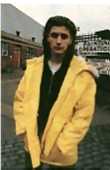
On
the day we fly out to Belfast with Mike Edwards, London wakes up to crippling
blizzard conditions, terrorists fire mortar bombs into the Prime Minister's
back garden and the new Jesus Jones album Doubt goes gold after
entering the charts at pole position. Number One with a surface-to-air
missile.
Jesus Jones mastermind Mike surveys his campaign with the quiet confidence of
a seasoned general. For him, this newfound success is a belated but irrefutable
reply to what he views as two years of sniping and snobbery, beginning with
allegations of hype surrounding their late-'88 debut single 'Info Freako'.
Part of the adverse reaction was doubtless encouraged by Mike re-inventing himself
as brattish band spokesman Jesus H Jones, and making revolutionary claims for
their mesh of pop melodies and sample-studded hip-hop technology. But Andy Ross
of Food Records, the EMI-funded indie who signed Jesus Jones on the strength
of their £125 'Info Freako' demo and released it unaltered, claims this
hostility was a smokescreen.
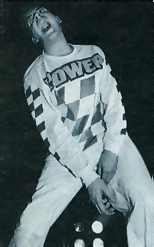 "We
caught people with their trousers down. The more influential writers,
if they're not seen to be patronising a band from the outset, tend to
cover their tracks by slagging them off." He would say that, of course.
At the time of 'Info Freako' Andy told a mutual acquaintance that Jesus
Jones were going to make him a millionaire. Andy currently lives in a leaky
one-bedroom flat but still has total faith in the band's potential for
global success, mainly due to Mike's "ultimate perfectionist"
approach of writing, producing and controlling as much of his career as
humanly possible.
"We
caught people with their trousers down. The more influential writers,
if they're not seen to be patronising a band from the outset, tend to
cover their tracks by slagging them off." He would say that, of course.
At the time of 'Info Freako' Andy told a mutual acquaintance that Jesus
Jones were going to make him a millionaire. Andy currently lives in a leaky
one-bedroom flat but still has total faith in the band's potential for
global success, mainly due to Mike's "ultimate perfectionist"
approach of writing, producing and controlling as much of his career as
humanly possible.
"I don't think he'll ever be satisfied; he's one of these people who never
live up to their own expectations no matter how well they do." A cause
of friction within the group? "There would have to be tension, because
no-one else could possibly live up to his standards."
Head of A&R at EMI and recently voted Britain's most eligible bachelor by
Company magazine, Nick Gatfield was jointly responsible with Food chief
David Balfe for siging Jesus Jones. As well as conventional yardsticks like
"musicality" and "crossover potential", he was greatly impressed
by Mike's sound commercial sense. "The one rare quality he does have as
an artist is a sense of working with a record company to break him wide-open
rather than sabotage his plans of cult status."
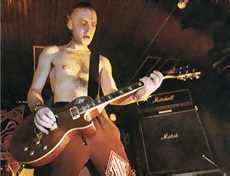 Opening
gambit in the world domination bid was signing Jesus Jones to a manager
more used to selling stadium acts like Peter Gabrial than punky young
hopefuls. Gail Colson thought 'Info Freako' sounded like "a cross
between The Who circa 'My Generation' and The Sex Pistols", and views
Mike's dominant role as healthy. "In all the bands that have lasted
a long time, one person has always come out," she maintains.
Opening
gambit in the world domination bid was signing Jesus Jones to a manager
more used to selling stadium acts like Peter Gabrial than punky young
hopefuls. Gail Colson thought 'Info Freako' sounded like "a cross
between The Who circa 'My Generation' and The Sex Pistols", and views
Mike's dominant role as healthy. "In all the bands that have lasted
a long time, one person has always come out," she maintains.
Whatever Mike's grasp of rock history, 1989's debut album Liquidizer
did not hack itself a prominent niche there. Cold and calculated, the relentless
pace of its rigid sonic assault smacked more of desperation than any profound
feel for pop dynamics. Its impenetrable grooves seemed to mirror the personality
of its chief creator, and the Jesus Jones machine momentarily stalled. But Mike,
according to EMI press officer Anton Pace, is "a different kind of pop
star... a man who knows exactly where he's going and will undoubtedly get what
he wants." 1990 looked like low-profile year for Jesus Jones at home, apart
from one single 'Real Real Real' and a well-publicised jaunt to Romania. In
reality, the wheels were turning to finally launch them as proper pop stars,
with tours of Japan, Australia and America and PWL-mixed singles like 'International
Bright Young Thing' being groomed for breakthrough radio airplay. Meanwhile,
down in the forest, a bunch of snotty upstarts called EMF were watching their
every move.
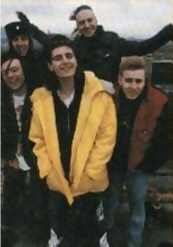 In
Belfast a bizarre dilemma arises. Photographer Ian Dickson wants to snap
Mike in front of David and Goliath, the giant cranes in Belfast's famous
Harland & Wolf shipyard, whose bright yellow hues nicely match the
pop star's hip-hop jacket. But Mike hesitates after learning of the ship-builders'
reputation for discrimination against Catholic workers. In a city where
four in every five Catholics are unemployed, even this abstract visual
symbol might be construed as politically sensitive. But, after a moment's
deliberation, the shoot goes ahead. Diplomacy is Mike's chosen weapon.
Scrupulously polite and punctual, always weighing up implications, he
goes beyond common courtesy into methodical, almost military single-mindedness.
In
Belfast a bizarre dilemma arises. Photographer Ian Dickson wants to snap
Mike in front of David and Goliath, the giant cranes in Belfast's famous
Harland & Wolf shipyard, whose bright yellow hues nicely match the
pop star's hip-hop jacket. But Mike hesitates after learning of the ship-builders'
reputation for discrimination against Catholic workers. In a city where
four in every five Catholics are unemployed, even this abstract visual
symbol might be construed as politically sensitive. But, after a moment's
deliberation, the shoot goes ahead. Diplomacy is Mike's chosen weapon.
Scrupulously polite and punctual, always weighing up implications, he
goes beyond common courtesy into methodical, almost military single-mindedness.
Just over 24 hours in Northern Ireland will see him tackle the first night of
a national tour, two photo-shoots and five interviews. He tells Declan McGrath
of Belfast Community Radio how his band's new commercial clout comes from EMI
taking Jesus Jones seriously, with the simultaneous worldwide release of
Doubt, while John Daly of Downtown Radio learns of their ambition to be
the bigegst band in the cosmos. "If everything went right for Jesus Jones,"
Mike confesses later, "people would change all their ideas about music.
They would give up this retrogresive thing, we would be bigger than U2, we would
have the same expectations about our records as The Beatles had when theirs
came out. All things that go with being in band at the absolute top."
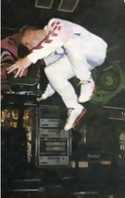 Having
hit singles is all very well, but nowhere near enough for Mike. "If
I can change the course of rock music, that will be closer to my goal
... there is not a lot to say we are of any note, and this way you are
putting yourself in the history books; you can prove to yourself you have
existed."
Having
hit singles is all very well, but nowhere near enough for Mike. "If
I can change the course of rock music, that will be closer to my goal
... there is not a lot to say we are of any note, and this way you are
putting yourself in the history books; you can prove to yourself you have
existed."
Put in such terms, the rise of Jesus Jones sounds painfully contrived. Mike
happily admits to concocting the concept on a Spanish beach in 1988, with various
band members deciding how to mesh powerful rap-metal noises to a pristinely
packaged image. "We knew we had to have a great name; we started from the
name downwards."
The evangelical Jesus Jones roadshow goes back to mainland Europe this month.
Mike derives few pleasures from his punishing work schedule, puritanical lifestyle
(no drink, no drugs, no groupies) and extended periods away from his Swedish
wide Fia. The loneliness of the long-distance pop star. For Mike the ends justify
the means, something he learned from Machiavelli's 16th century blueprint for
political ambition, The Prince.
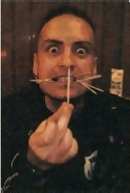 "People
believe The Prince is evil because they confuse immorality with
amorality. Somewhere along the line Machiavellian has to come to mean
evil, which is ludicrous: the book basically deals with the realities
of human nature. I read it on our American tour in September, one month
after the invastion of Kuwait, and it just seemed like it was Saddam Hussein's
textbook - he was doing everything the right way." Although impressed
by Saddam's shrewdness, Mike openly supports Britain's action in the Gulf
and his outspoken views sometimes invite trouble. During January's Great
British Weekend, he publicly expressed solidarity with Billy Bragg's anti-war
comments but clashed with him backstage. "What I said on-stage at
Wembley was basically agreeing with the majority of Billy Bragg's speech,
which was that people are dying and it's a terrible thing. However, he
came to the dressing room and asked if we'd do an anti-war benefit and
obviously, because of my views, I couldn't do it." Where other pop
people might take evasive or ambiguous stands, Mike speaks his mind. Sipping
herbal tea in Belfast's Europa hotel, he rails against all manner of rock'n'roll
behaviour. "I dislike excess; it's the worst form of conformity there
is, a cartoon idea of what rock stars should be. I loathe and detest rock-star
bullshit, because it doesn't achieve anything."
"People
believe The Prince is evil because they confuse immorality with
amorality. Somewhere along the line Machiavellian has to come to mean
evil, which is ludicrous: the book basically deals with the realities
of human nature. I read it on our American tour in September, one month
after the invastion of Kuwait, and it just seemed like it was Saddam Hussein's
textbook - he was doing everything the right way." Although impressed
by Saddam's shrewdness, Mike openly supports Britain's action in the Gulf
and his outspoken views sometimes invite trouble. During January's Great
British Weekend, he publicly expressed solidarity with Billy Bragg's anti-war
comments but clashed with him backstage. "What I said on-stage at
Wembley was basically agreeing with the majority of Billy Bragg's speech,
which was that people are dying and it's a terrible thing. However, he
came to the dressing room and asked if we'd do an anti-war benefit and
obviously, because of my views, I couldn't do it." Where other pop
people might take evasive or ambiguous stands, Mike speaks his mind. Sipping
herbal tea in Belfast's Europa hotel, he rails against all manner of rock'n'roll
behaviour. "I dislike excess; it's the worst form of conformity there
is, a cartoon idea of what rock stars should be. I loathe and detest rock-star
bullshit, because it doesn't achieve anything."
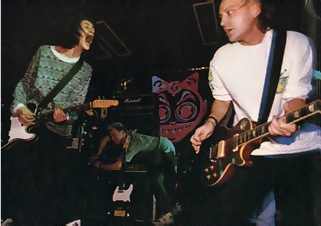 "A
photographer told me that the most organised people he'd ever come across
were the Happy Mondays, and it's very obvious when you see them play that
they're not a bunch of shabby degenerates. It's no coincidence that Mick
Jagger was at the LSE - you either need a large degree of intelligence
or total stupidity to be successful as a rock band." But Mike's monastic
nature has deeper roots, in his self-confessed " control freak"
mentality which oversees the band's music, artwork and public image.
"A
photographer told me that the most organised people he'd ever come across
were the Happy Mondays, and it's very obvious when you see them play that
they're not a bunch of shabby degenerates. It's no coincidence that Mick
Jagger was at the LSE - you either need a large degree of intelligence
or total stupidity to be successful as a rock band." But Mike's monastic
nature has deeper roots, in his self-confessed " control freak"
mentality which oversees the band's music, artwork and public image.
He even vetos journalists who do not meet his requirements. I almost lost this
assignment thanks to a throwaway comment I made about Jesus Jones in an ancient
review of another band.
"That's why I write all the stuff, because when I started in bands I could
see a load of people messing around, not getting things done. Eventually I thought:
sod this, I'm taking control." Isn't he afraid of coming across like some
anally retentive dalek? "I am uptight, frequently referred to as pompous,
but to me control is most important if I am going to achieve what I want."
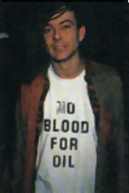 Mike
admits this uncompromising attitude creates "polar extremes"
wihin the band, but the power balance is maintained with very blunt rules.
"The first time you see a member of Jesus Jones drunk on stage will
be the very last time you see that member on stage."
Mike
admits this uncompromising attitude creates "polar extremes"
wihin the band, but the power balance is maintained with very blunt rules.
"The first time you see a member of Jesus Jones drunk on stage will
be the very last time you see that member on stage."
All of this paints the other four members of Jesus Jones as faceless drones
drafted in to kick-start Mike's career. Veteran photographer Ian is reminded
of Brian Ferry, and a solo project certainly seems logical. Not likely, say
the band: Mike needs them to inject humour and humanity into his aloof and frequently
mechanical ideas, and he receives no star treatment on tour. He shares hotel
rooms with drummer and old school friend Gen, occupies a bunk on the tour bus
like everyone else, and enjoys no special deals or preferential wages from the
band's contract with Food.
Keyboardist Iain Baker, formerly Barry D, is tired of stressing his individuality
in press profiles. "None of us has ever wanted to be Mike. His ideas are
so obviously geared for success that it makes sense for us to execute them rather
than let ourselves be waylaid by conflicting personal interests. He doesn't
work well with other people, but you can always give him ideas." For example,
the band's early skatepunk image was largely down to Iain arranging discount
in the shop where he worked before Jesus Jones took off.
That, too, was ridiculed. "The press were desperately trying to find a
hype, and when they didn't they got very upset and created one. We're too normal,
too middle-class, this nice boy thing people level at us... they imply that
because of that there's no substance." Iain views the recent EMF fiasco
as further evidence of media hostility and double standards.
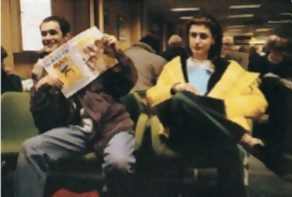 "Everyone's
latched onto this damaging idea that EMF are a party band and all they
do is take drugs and pull women; that they're essentially self-destructive.
That's very tough on EMF because they'll end up having to perform in a
certain way."
"Everyone's
latched onto this damaging idea that EMF are a party band and all they
do is take drugs and pull women; that they're essentially self-destructive.
That's very tough on EMF because they'll end up having to perform in a
certain way."
Bassist Alan Jaworski is philosophical about EMF's meteoric success. "If
we've created a new musical trend and they've followed in our wake, there's
no reason why they shouldn't survive." Alan, along with Maltese-born guitarist
Jerry De Borg, constitute the rock'n'roll element of Jesus Jones. Which means
they drink and fart slightly more than the others, occasionally causing minor
friction on the tour bus.
Jerry is actually the mellowest axe-hero on Earth and enjoys a quiet chuckle
when reminded of Mike's rules about drunkenness. "We have gone onstage
out of our heads on various substances, and you just sound crap - you can't
sing in tune, you can't play in time... Mike is like a piece of glass to me,
I'm sure he thinks he's really complicated and there's no way I'll ever understand
him, but I know what he's thinking. Everyone does."
Great. Time to play Bitch About The Boss. Gen, who lives with Mike and his wife,
reveals "he's obsessive about everything he does, not just the band."
"It's so obviously an inadequacy," gushes Iain excitedly. "He
desperately wants more and more people to look at him and it's never enough.
He's never happy, he's always searching for even more recognition. Mike would
like to think he's giving away a lot in his songs, through his soul-searching,
but I don't think some of the deepest things he feels will ever come out...
there's no humanity in what he does."
Iain's words ring particularly true at the night's gig, where Mike's rock'n'roll
posturing seems stilted and forced. But he holds together the band's turbocharged
thrashing with admirable efficiency, plotting one more coordinate on the Jesus
Jones success chart. Indeed, the singer's emotional constipation may well prove
to be his fortune, his self-confessed "immense depressions" inspiring
intense self-determination and brilliant albums like Doubt. For Mike
Edwards, there's no alternative. "I see no reason why I shouldn't be a
musician, unless I had my hands chopped off. Even if I had my hands chopped
off, I would bring it back round to being a musican."
Don't stand in this man's way.
Interview - Scene US magazine - circa April 1991
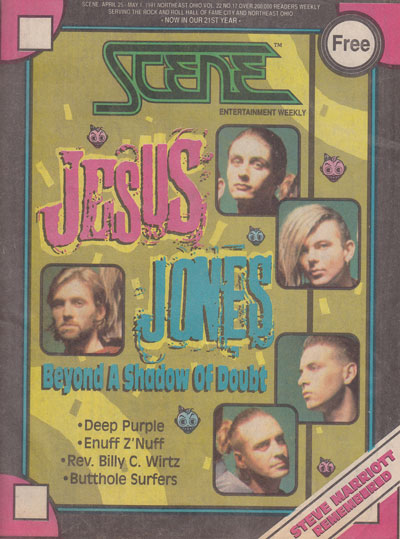 "In England we are referred to as the 'uncategorizable Jesus Jones,'" said the band's creator/lead singer/songwriter/guitarist/producer Mike Edwards in a phone conversation from New York. "It's quite pleasing that no one can put their finger on us."
"In England we are referred to as the 'uncategorizable Jesus Jones,'" said the band's creator/lead singer/songwriter/guitarist/producer Mike Edwards in a phone conversation from New York. "It's quite pleasing that no one can put their finger on us."
Not for lack of trying. Jesus Jones' music has been compared to everything from acid house to heavy metal, been called "pretty-in-your-face rock," and been compared to bands ranging from Sonic Youth, Pop Will Eat Itself, the Kinks, the Beatles, Public Enemy, the Cult and Ministry. The fact of the matter is, Jesus Jones sounds like only one band, and that's Jesus Jones.
Very likely the best new band of the '90s, and as Musician magazine put it, "the future of English Rock," Jesus Jones is breaking new territory while still making their music feel comfortably familiar. There's something recognizable but never imitative in the bass lines and harmonies that draw from a number of influences. But there's something strictly Jesus Jones in the combination of rock and dance music, and in their manner of coupling straightforward guitars-bass-drums-keyboards with technology.
Many bands lean on sampling as a crutch and as a result create single layered music. Mike Edwards, on the other hand is able to manipulate the sampler as if it's an instrument in its own right and lay multi-layered textures over the band's foundation.
"I'm not happy with the usual ways of sampling," Edwards explained. "A lot of sampling is artistically reprehensible. The idea of the sampler being used as a sort of digital tape recorder is a waste of resources and imagination. The sampler is an amazing machine. you can pervert and twist and distort sounds so widely that really the only limit is your imagination. You have to decide whether you're exhilarated or frightened by the prospect. I err on the side of exhilarated. M.C. Hammer I think is terrified."
The five-man Jesus Jones band was assembled by Edwards. "I've known the drummer [Gen] for 12 years, the bass player [Al Jaworski] I met through a friend of a friend, the guitarist [Jerry De Borg] we got through the back pages of Melody Maker, and the keyboard player [Barry D.] I met in a skateboard shop ," Edwards recalled.
The band, which formed just a couple of years ago, played a few gigs in British clubs and then put together a demo tape. "We sent the demo tape in to Food Music and two days later they were screaming down the phone, 'You've got to come in and meet us,'" Edwards said. "Two months later we were signed."
In England the band received unusual support for a beginning
alternative band. The BBC, infamous for not playing alternative music during regular daytime programming, broke format and played Jesus Jones' single "Info Freako" (from the demo tape and from LIQUIDIZER, their first album) on daytime air.
"I think there were people there who thought, 'There's something happening - there's a really successful band that came out of nowhere.' They were playing our first demo tape which almost made the Top-40 in Britain. we made a huge noise with that one song. It was a very unusual song and we made a big impact as soon as we came out."
Jesus Jones' British label, Food, is licensed throughout the world by EMI. SBK, another EMI-related company, is the one Jesus Jones chose to go with for the their American distribution. "SBK stuck out like a sore thumb," Edwards explained. "It was a company we thought we'd do very well by because they're very young and enthusiastic. They love the band and they were fighting desperately to get us. They just seemed to do the right thing from the word go."
Jesus Jones' first release, LIQUIDIZER, was an alternative chart, club and college radio success. Their follow-up, DOUBT, showed great success as well having reached #33 on Billboard's Top 200 Pop Albums chart and landing the first single, "Right Here, Right Now" at #65 from #94 in just three weeks on the Hot 100 Singles chart.
Every bit as good as LIQUIDIZER, DOUBT feels like a logical growth from their first effort. "The interviews I did for LIQUIDIZER were influential in the way DOUBT turned out," Edwards said, "because I was finding out what people liked about LIQUIDIZER - the criticisms they had - and I was responding to being questioned and doubting myself. That's why we came up with the title and the songs that deal with doubt."
Accoding to Edwards, LIQUIDIZER and DOUBT differ in their "eclecticism." "DOUBT was an album that was meant to be unfashionably eclectic and that was going to show our pluralistic approach to music in a way that left no doubt whatsoever," he said. "On LIQUIDIZER there was one sort of central concept: mixing dance music and rock music and doing it before anybody else did it - because remember all these songs were written in 1988. With DOUBT the idea was to make it an album of extremes, each track different than the one before. Although we used a wide variety of samples and influences on both albums, how they were expressed is very different. It's the same sort of pluralism, on both albums, but I think highlighted more on DOUBT."
The mastermind behind Jesus Jones, Edwards writes all the lyrics and music, handles the arrangements and produces many of the cuts. When he writes songs he starts with the music. "The mood of the lyrcis is created by the mood of the music. I couldn't really do it the other way around," he said.
There are many moods on DOUBT and some thought-provoking lyrics. On "Welcome Back Victoria" Ewards sings about the world's return to Victorian values. "It's an old cliche in Britain now, but I think it's about the return of conservatism throughout the world, particularly in America and England," he said.
Conversely, "Right Here, Right Now" is an overwhelming optimistic song. Edwards sings, Right here , right now/There is no other place I'd like to be/Right here, right now/Watching the world wake up from history. It's a song about how it's great to be alive," he explained. "It was written at the beginning of 1990 while seeing the events in Eastern Europe.
At the time of the interview Edwards had just been through half of Europe for the beginning of the band's world tour that will take them through the rest of Europe, the States, part of Canada, Australia, New Zealand and Japan. (They play in Cleveland at Empire on Thursday, May 2 in a SCENE co-sponsored show).
"We're pretty big at home now," Edwards said. And he thinks the band will be able to conquer America as well. "I think all the signs are there for us to be big in the States. There aren't many good rock bands at the moment, but we're certainly one of them. Americans seem to be reaching that conclusion themselves."